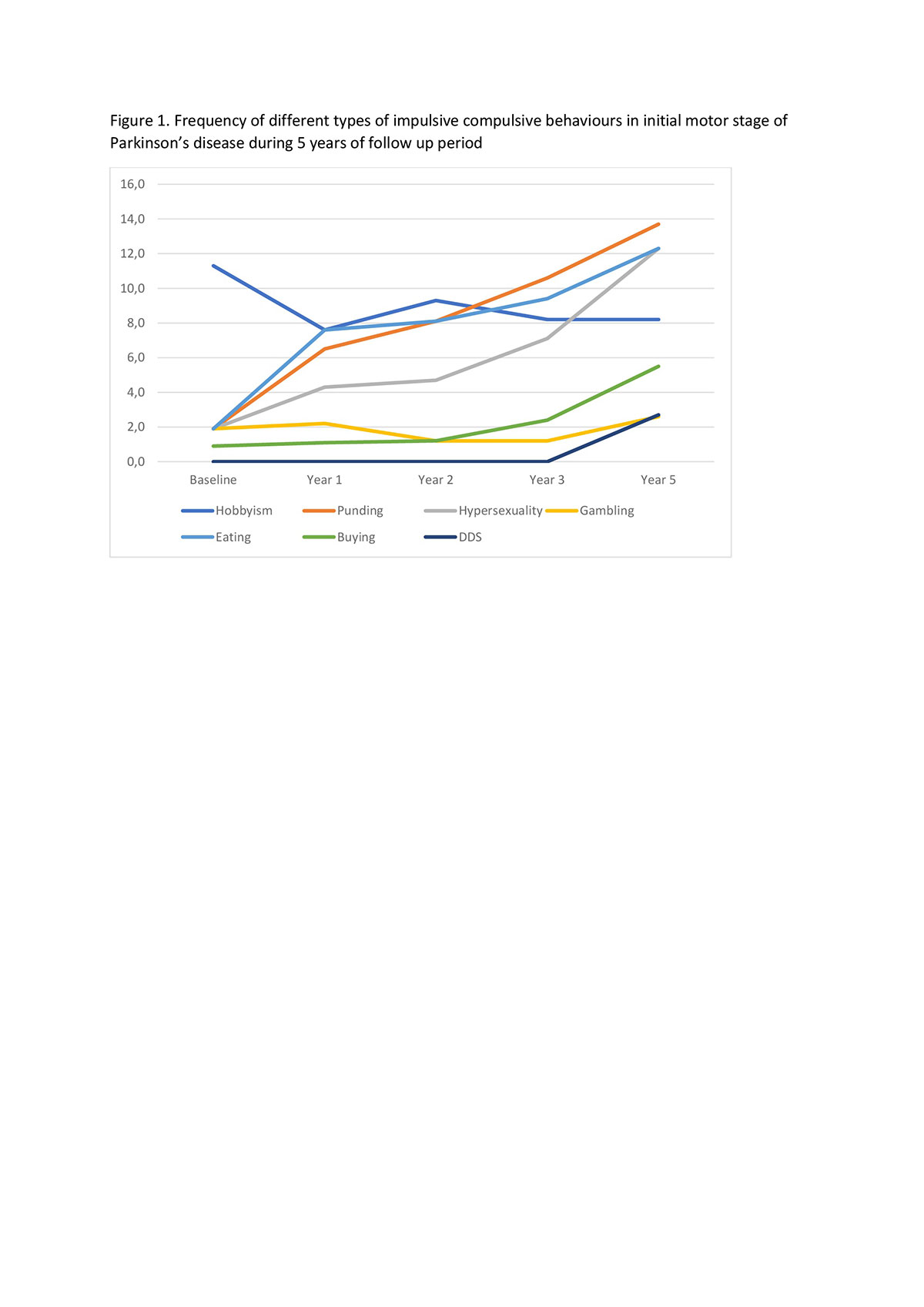Session Information
Date: Monday, September 23, 2019
Session Title: Psychiatric Manifestations
Session Time: 1:45pm-3:15pm
Location: Les Muses Terrace, Level 3
Objective: To assess longitudinally impulsive-compulsive behaviours (ICBs) in a cohort of Parkinson’s disease (PD) patients at the initial stage of the disease during 5 years of follow up.
Background: ICBs in PD are debilitating disorders of repetitive, excessive and compulsive nature affecting up to one third of PD patients. Use of dopamine agonists (DA), earlier disease onset and more severe psychiatric symptoms are recognized as risk factors.
Method: We enrolled 231 subjects, 106 PD outpatients at the Hoehn&Yahr stage 1 and 125 matched healthy controls (HC). All participants were assessed for the presence of any ICB using the current criteria and a comprehensive clinical interview. Additionally, Questionnaire for Impulsive-Compulsive Disorders in PD (QUIP) was administered. At study entry, all participants underwent clinical, neuropsychological and psychiatric evaluations. Patients underwent same protocol at each consecutive visit (after 1, 2, 3 and 5 years).
Results: At baseline, 19.8% PD patients and 10.4% HCs had ICBs (p=0.061). PD-ICBs were more frequently male (p=0.030), had higher QUIP scores (p<0.001) and were more often treated with dopamine agonists (p=0.013) when comapred to PD-noICBs. When compared to HCs, all patients showed more psychiatric symptoms and worse cognitive performance. Furthermore, 20.7%, 22.1%, 25.9% and 29.2% patients had ICB after 1, 2, 3 and 5 years, respectively (p=0.023), with cumulative prevalence of 36.8% and significant difference between 2nd and 3rd year (p<0.001) and 3rd and 5th year of follow-up (p<0.001). At baseline, 21.1% PD-ICBs had multiple disorders increasing to 61.9% at year 5 (p=0.009). During time, we showed significant interaction of presence of ICBs and QUIP score (p<0.001) and motor UPDRS score (p=0.014). Logistic regression showed that DA treatment at baseline carried 5 times higher chances of having ICB anytime during study. Specifically, chance of pathological eating was 16 times increased with DA treatment. Punding was more probable with higher levodopa equivalent doses at baseline and younger age. Male patients had 14 times more chances of hypersexuality. Compulsive buying was two times more probable in patients with depression at baseline and with younger age.
Conclusion: Patients showed increasing frequency and complexity of most ICBs during follow-up period. High heterogeneity of ICBs was confirmed with specific risk factors identified for different types of ICBs.
To cite this abstract in AMA style:
V. Markovic, I. Stankovic, I. Petrovic, T. Stojkovic, V. Kostic. Prospective study on impulsive-compulsive behaviours in early Parkinson’s disease [abstract]. Mov Disord. 2019; 34 (suppl 2). https://www.mdsabstracts.org/abstract/prospective-study-on-impulsive-compulsive-behaviours-in-early-parkinsons-disease/. Accessed February 15, 2026.« Back to 2019 International Congress
MDS Abstracts - https://www.mdsabstracts.org/abstract/prospective-study-on-impulsive-compulsive-behaviours-in-early-parkinsons-disease/

